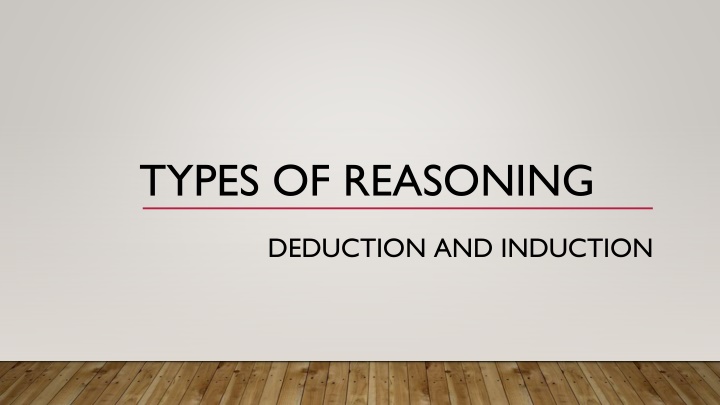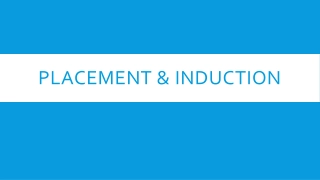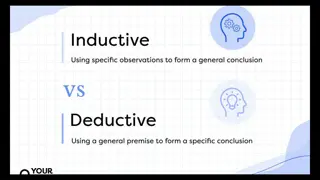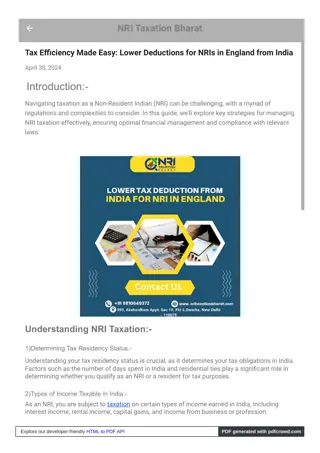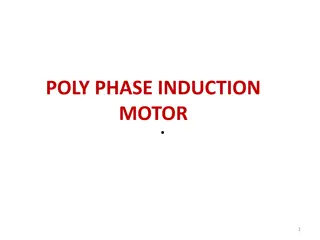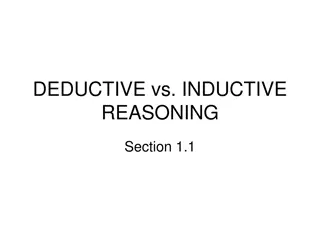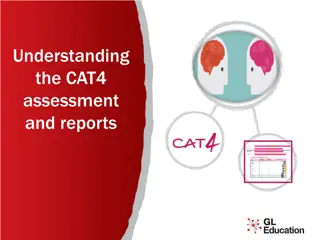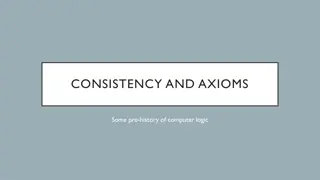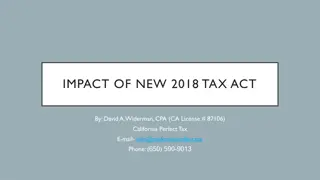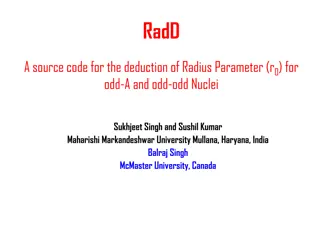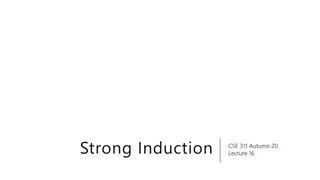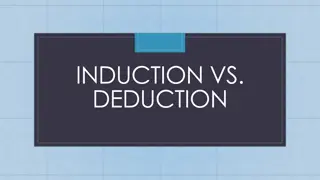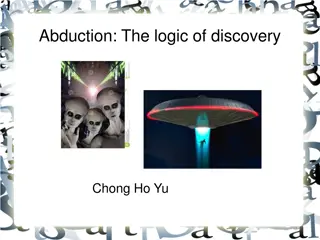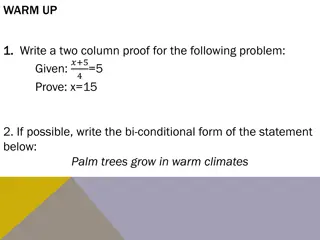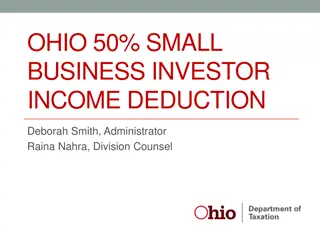TYPES OF REASONING DEDUCTION AND INDUCTION
Reasoning involves a connected sequence of thoughts leading to a conclusion. Deductive reasoning moves from general to specific, identifying assumptions and hidden premises. Categorical syllogisms demonstrate valid and sound argument structures, while real-life arguments may require uncovering assumptions. Hidden premises in deductive arguments can make them valid but not sound, depending on the strength of the assumption. Examples illustrate how hidden premises impact the validity and soundness of deductive reasoning.
Download Presentation

Please find below an Image/Link to download the presentation.
The content on the website is provided AS IS for your information and personal use only. It may not be sold, licensed, or shared on other websites without obtaining consent from the author.If you encounter any issues during the download, it is possible that the publisher has removed the file from their server.
You are allowed to download the files provided on this website for personal or commercial use, subject to the condition that they are used lawfully. All files are the property of their respective owners.
The content on the website is provided AS IS for your information and personal use only. It may not be sold, licensed, or shared on other websites without obtaining consent from the author.
E N D
Presentation Transcript
TYPES OF REASONING DEDUCTION AND INDUCTION
WHAT IS REASONING? Reasoning is a connected sequence of thought that is directed towards a conclusion.
DEDUCTIVE REASONING - FROM GENERAL TO SPECIFIC - IDENTIFYING ASSUMPTIONS AND HIDDEN PREMISES
CATEGORICAL SYLLOGISM All men are mortal. Premise Things that are mortal Socrates is a man. Premise What can we work out from these two statements? What conclusion can we draw? Therefore, Socrates is mortal. Conclusion Men S There is no other conclusion that can be drawn from these premises. This is a VALID and SOUND argument.
All women are mothers. Kelly is a woman. So, Kelly is a mother. Is this syllogism valid and sound?
ARGUMENTS IN REAL LIFE In real life, an argument is rarely laid out so neatly. We have to search for the premises and conclusion before we can evaluate the argument. Often, the conclusion is stated first, and then followed by the premises. Sometimes a premise is missing or simply assumed. e.g. Sam obviously likes sport, he s a boy.
SAM OBVIOUSLY LIKES SPORT, HES A BOY. Is there something assumed or taken for granted in this argument? What is the assumption exactly? Does the argument depend on this assumption? Is the assumption reasonable or unreasonable? (Are we justified in believing it?)
WRITE IT AS A DEDUCTIVE ARGUMENT Written as a formal argument, the assumption becomes a hidden premise Now the conclusion follows from the premises. It is a VALID argument, but if we interrogate the content, we find that the argument is NOT SOUND. The hidden premise expresses an assumption, and that assumption is a stereotype. But is it a strong stereotype/generalisation? Premise 1: Sam is a boy. Premise 2: (All boys like sport.) Conclusion: Sam likes sport.
ANOTHER EXAMPLE Spot is a dog, so Spot is a mammal. Hidden Premise: All dogs are mammals. The hidden premise All dogs are mammals is a true statement/a fact. Therefore, the assumption is justified. Premise: Spot is a dog. Conclusion: Spot is a mammal. This argument is VALID and SOUND.
SUMMARY Sometimes arguments rely on an assumption being made (hidden premise). Types of assumptions: Gender or social stereotypes Hasty generalisations An argument with a hidden premise or assumption is fine, as long as it is a reasonable assumption and does not compromise the soundness of the argument and hence the truth of the conclusion.
YOUR TURN 1. Write each argument out in full, identifying the hidden premise. 2. Is the assumption reasonable? Explain. 3. Is the argument valid and/ sound? a) Susie goes to Hillbrook school, so she wears a Hillbrook uniform. b) Bill has to go into his Hillbrook class now so he will not be allowed to use his phone. c) This business is a huge success, just look at all the profit they ve made this month.
YOUR TURN Come up with your own deduction with hidden a assumption. We will try to figure out what the assumption is.
IN GROUPS OF 3... Complete deductive reasoning activity!
INDUCTIVE REASONING - FROM SPECIFIC TO GENERAL - ANALOGIES AND GENERALISATIONS
INDUCTIVE REASONING: WHAT MIGHT OCCUR AS A RESULT? Claim goes beyond the information contained in the premises. Base our conclusions on the probability of something happening, but we cannot guarantee the conclusion we propose. Built on warranted generalisation. Philosopher Karl Popper encouraged falsifiability, that is to build scientific arguments which have the capacity to be proved false. Inductive arguments: likely, probably, possibly.
EXAMPLE... Everyone outside has their raincoat on, so... We take the information we have and think about the possible outcomes. It involves inference-making, and leaves us with a conclusion that can be anything from not very likely at all, to extremely likely. It might be raining, but it is also possible that there are other reasons for the wearing of raincoats. Such as... We don t know for sure we are making an inference. Induction is based on probability... this is what philosopher David Hume says is the problem of induction. Although it may be extremely likely, it is never logically guaranteed.
YOUR TURN... MAKING INDUCTIVE INFERENCES ACTIVITY! What might occur as a result of the following actions? Consider... What might logically follow? What prior knowledge/experience have you based that on? Was this decision/action reasonable? Why/Why not? What action would you have taken? Why? If your action was different from the given scenario, what might follow from your action?
Justification - the actions of showing something to be right or reasonable Dogs must be warm blooded because Dogs are mammals so/therefore Dogs must be warm blooded Dogs are mammals Inference - a conclusion reached on the basis of evidence and reasoning
YOUR TURN JUSTIFICATION AND INFERENCE ACTIVITY! Key point: Justification and inference are the inverse of each other.
SUMMARY https://www.youtube.com/watch?v=yAjkQ1YqLEE REFLECTION QUESTIONS: 1. The difference between deduction and induction is... 2. The difference between justifying and inferring is... 3. Something useful I will take away from today s lesson is... I think this is/will be useful because...
HYPOTHETICAL REASONING If... then...
